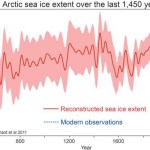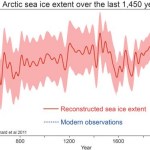Arctic sea ice
Here's a graph showing the extent of arctic sea ice as measured directly and indirectly for the last several hundred years:
Solid red line is the reconstructed 40 year smoothed, late-summer Arctic sea ice extent from Kinnard et al. (2011). Shaded area shows 95% confidence interval. Blue dashed line shows modern observations.
This graphic is from Skeptical Science, where you can also download a higher res version and learn more about the background for these data. Also, on that page is a link to a large number of useful graphics related to climate change.
.
NSIDC has (preliminarily) announced the new record low ice extent for 2012.
On September 16, 2012 sea ice extent dropped to 3.41 million square kilometers (1.32 million square miles). This appears to have been the lowest extent of the year. In response to the setting sun and falling temperatures, ice extent will now climb through autumn and winter. However, a shift in wind patterns or a period of late season melt could still push the ice extent lower. The minimum extent was reached three days later than the 1979 to 2000 average minimum date of September 13.
This year’s minimum was 760,000…
POTSDAM – In 1845, Captain Sir John Franklin of the British Royal Navy led 128 men on two iron-plated steam ships, Erebus and Terror, into the Arctic, where they eventually disappeared. The voyage was the culmination of four centuries of failed attempts to navigate the Northwest Passage – a direct route from Europe to Asia across the Arctic Ocean – and remains one of the greatest tragedies in the history of polar exploration.
Today, a far greater Arctic tragedy is unfolding: the Arctic sea-ice cap is melting. Last month, an unprecedented new low was reached after decades of decline. Indeed,…
[Update: as pointed out in comments, this forecast is for a town called North Pole, Alaska, not the geographic north pole, or even the magnetic one...I must apologize for my haste and sloppiness. On the other hand, this incident has cleared up a number of long-standing structural engineering questions I have had about Santa's Workshop...]
I have never checked a site like Weather.com for the North pole before, so not really sure how much to trust this forecast. If it is accurate, we are looking at some pretty balmy weather up there for the next ten days and perhaps a late…
August sea ice extent in the Arctic this year was 640,000 square kilometers below the previous record set in 2007. It is also already a record monthly low for any month, though that record will not last as it is going to be broken this September when the lowest extent of the year is normally reached. In less than the last two months, multi-year ice declined by 33% and the oldest ice (over 5 years) declined by 54% (and that ice ain't coming back). While the unusual Arctic Cyclone probably had a noticeable impact on the evolution of this year's (still deepening) record ice loss, it…
As Eli Rabbet is noting, Anthony Watts is really unraveling, even further than we noted here a couple of days ago. So, I just have to post the video below, picked up from Denial Depot. I swear, I am NOT calling Watts Hitler, not even a Nazi, it is just pretty funny!
Real Climate has done two posts recently that I thought would be served well by their juxtaposition. The first one highlights an early projection of global mean temperatures made by Jim Hansen in 1981.
The abstract for that paper contains this choice quote:
It is shown that the anthropogenic carbon dioxide warming should emerge from the noise level of natural climate variability by the end of the century, and there is a high probability of warming in the 1980's.
These are both things that have in fact happened. I think it is safe to call this a very successful early prediction of…
No, this is not Steve McIntyre finally coming out with his own multi-century proxy temperature reconstruction. Nor is it Anthony Watt's release of his surfacestations.org temperature reanalysis.
It is the take away figure from a recent paper in Nature by Kinnard et al that reconstructs the extent of arctic sea ice over the last 1450 years.
Tamino has a discussion of it here.
There is not really much to add to the thousand words that image conveys.
What Exxon says, through its various mouthpeices, that global warming is not happening or is happening but reversing or what have you, is apparently not what it believes.
Once seen as a useless, ice-clogged backwater, the Kara Sea now has the attention of oil companies. That is partly because the sea ice is apparently receding.
Two billion is alot of money to put where your mouth is not!


